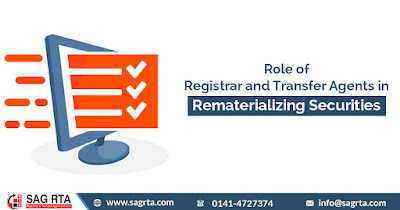It is the technology which takes a normal growth rate of business to an accelerated progress dexterity. Whether it is a normal course of operation of an organisation or serving the clients with customer care facilities, technical advancement is necessary to make a win-win. In today’s digital era, if you are not upgraded with technologies and latest utilities, you can not ensure automation, ease and accuracy.
Last few years evidence the enormous growth & success encountered by Mutual Fund houses. Here as well, the credit goes to high technology, the hi-tech facilities given by the Registrar & Share Transfer Agent (RTA).
It is only because Registrar and Transfer Agents (RTAs) that mutual fund houses could get to the top quickly and amazingly among other institutions of the financial sector such as banks, insurance companies, brokerage firms, etc.
RTA agent is a cornerstone behind the astounding progress of mutual fund houses. By introducing & promoting advanced technology in the mutual fund houses, RTA Agent has assured accuracy and value addition in the services of mutual fund houses.
Technology has transformed the financial sectors in a never-imagined way. Some of the examples include e-investment tools for investors and distributors, intermediary interfaces, data sharing apps, digital transaction systems; they all are techno-driven and bolstered.
Today, it's a matter of a few clicks and seconds to encash the money, to transfer the money, to get monthly payouts, to upload the investment statistics on different platforms. Similarly, executing a Systematic Investment Plan (SIP) with a mutual fund houses, asset management entity or insurance firm has brought high-level of convenience for investors, it would not have been possible without technological advancement.
Now let us shift our focus to Registrar and Transfer Agent and the way they have implemented technological up-gradation in the mutual fund industry to greet the ease, automation, speediness and many other exquisite services in the industry. We all know that RTA is linchpin behind the triumph & popularity of mutual fund houses. Let us march towards the answer to HOW?
A Registrar and Share Transfer Agent like SAG RTA being an intermediary serve the facilities to and interact with every stakeholder while maintaining the records of clients’ transactions on behalf of mutual fund houses.
Different key stakeholders like asset management companies (AMCs), fund accountants, couriers & postal agencies, exchanges, depositories, depository participants, mutual fund utilities, channel partners, payment aggregators, and banks are served through sustained interfaces.
Management of Data
RTAs also processes & transfers all the investors’ & investment-associated details & data from diversified sources in multiple formats. RTAs regularly interact and help every stakeholder of the mutual fund industry in the management & maintenance of their data.
Import Data in all Formats and Exporting Them in the Relevant One
With the use of technology-based systems Registrar & Transfer Agent meets the diversified needs of different mutual fund investors easily and also exchange data with them in multiple formats which includes CSV, DBF, Excel, text or advanced XML through web-services.
RTAs use technology-embedded system that creates the output files in accordance to the required data format and also input data in different formats from the stakeholders. Technology allows the RTAs to preserve the input and generate the output in the desired format.
It is because of the innovative approach of the Registrar & Transfer Agent industry that mutual fund houses could be ahead of the game and break new grounds. RTAs have been in the client’s best interest as well.
High Technology to Serve the Clients
Despite being highly successful & gangbusters, the whole Registrar & Share Transfer Agent industry endures to adopt cutting-edge technologies and implement ground-breaking ideas to serve the mutual fund industry and its clients in the best possible way.
Adherence to Government Rules & Regulations
RTAs keep updating themselves as per the amendments in government rules & regulations and latest notifications. This up-to-minute leg-up alongside the adoption of lead-forward technology let RTAs like SAG Infotech provide world-class services to mutual fund houses and investors in adherence to legal norms.
Safety, Security & Reliability
Beyond the shadow of a doubt, RTAs have been the true supporter for mutual fund stakeholders and the non-stop advancement in the RTA’s system & software guarantees reliability, security and confidentiality of big-league financial & investment-related facts & figures.
Reduction in no. of Complaints and Increment in Investments
Unprecedented technologies of RTA have revolutionised the mutual fund arena in which number of complaints have reduced and the mutual fund investments have grown quickly in the past few years.
Taking the Stakeholder Ahead
Besides, leading off important services, processes and statutory changes in the mutual fund industry, RTAs are driving the industry stakeholders to become a top-drawer with technological advancements through ground-breaking innovation and out of the box ideas.
Boosts Trust and Credibility within Investors & Regulators
Also, RTAs have upsurge the trust and assurance for mutual fund houses within investors, regulators and stakeholders. With the optimal use of hi-end technologies, RTAs are inviting front-line products, projects and procedures in the mutual fund industry.
For mutual fund customers as well, RTAs have played no small role by catering the most efficient & valuable facilities to them.
In the ever-changing dynamic market also, RTAs have potency and foresee to take mutual fund industry parallel or an advance of the banking sector.










